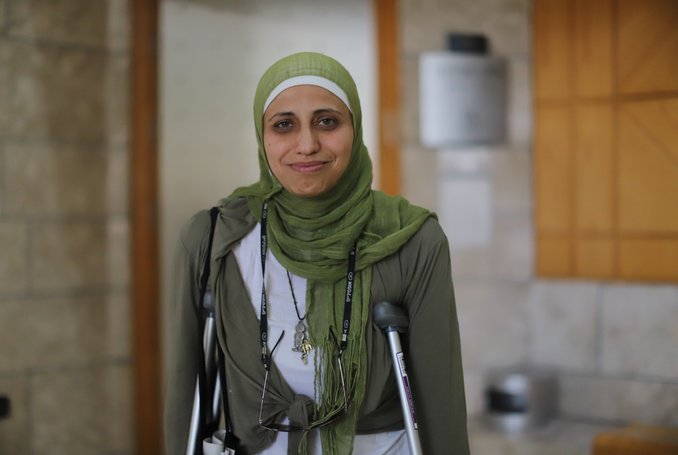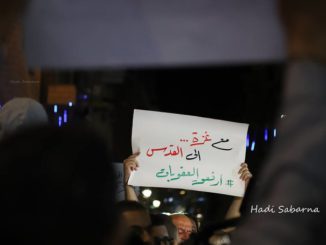
An Israeli court has sentenced Palestinian poet Dareen Tatour to five months in prison for “inciting terrorism” in a poem she posted on social media.
On Tuesday, Tatour, 36, was sentenced by the Nazareth district court after having already served nearly three years under house arrest.
"Resist, my people, resist them.
In Jerusalem, I dressed my wounds and breathed my sorrows
And carried the soul in my palm
For an Arab Palestine."Read the full poem that #DareenTatour is being put in jail for here: https://t.co/bKxB5OhEDS#Resist #Palestine #BDS
— AEM (@AEMahrakawy) July 31, 2018
Tatour was arrested during an Israeli police raid in October 2015, a few days after posting on Facebook and Youtube a video of herself reading a poem titled “Resist, my people resist them” as the soundtrack to images of Palestinians in violent confrontations with Israeli troops.
Prosecutors said her post was a call for violence. She spent the following months under house arrest, during which time she was barred from publishing her work and accessing the internet.
Dareen Tatour: Israeli Arab poet sentenced for incitement https://t.co/MAoioCWOWB
— Chance Heston (@mzw007) July 31, 2018
Tatour’s lawyer, Gaby Lasky, told Al Jazeera they will appeal the ruling and sentence.
Lasy said:
“I don’t think that writing a poem, even if it’s against the government is a crime. It’s regretful that in a country that believes in a democracy, will sentence to jail a poet because of a poem that she wrote. The prosecution wanted to send her to jail between 15 and 26 months [but] the judge decided to send her for five months which is still a long time in prison.”
In May, Tatour was convicted of online incitement of “terrorism” for her poem. Tatour has denied the charges.
In the video, which received less than 300 views, Tatour urged Palestinians to never “agree to a peaceful solution”.
Israeli Arab poet Dareen Tatour gets five-month sentence for incitement on social media – Israel News https://t.co/jUVukTw3ex
— Jake Gronie (@JakeGronie) July 31, 2018
She said there was no call for violence in her poem, but calls for a non-violent struggle, but Israeli authorities interpreted it to be violent.
She told reporters at the Nazareth Magistrate’s Court in northern Israel.
“I wasn’t expecting justice to be done. The case was political from the start because I am Palestinian and support freedom of speech.”
The indictment against her includes her lines:
“I will not succumb to the ‘peaceful solution’
Never lower my flags
Until I evict them from my land.”
The court also added a six-month suspended sentence to Tatour’s jail time, according to the official minutes distributed by the Justice Ministry.
#Palestinian poet #DareenTatour sentenced to 5 months in Israeli bail for writing a poem critical of the #Occupation #BDS #NoWayToTreatAChild
#America why are you supporting this injustice?#BDSOurWeapon #Apartheid #FreePalestine https://t.co/QGaYKVLbLw via @SamidounPP— Charafa (@freeworldun) July 31, 2018
As a resident of the Galilee village of Reineh near Nazareth, Tatour is a member of Israel’s Palestinian or Arab minority, who form nearly 20 percent of Israel’s population.
Palestinians remained on their land following Israel’s establishment in 1948, when 750,000 Palestinians were forced to flee their homes known as the “Nakba” or “Catastrophe”.
Dareen Tatour reading her poem "A Poet’s Hallucinations"
on International Women’s Day, Nazareth, March 8, 2013https://t.co/pAsUM9YWE1— Nayrouz (@Nayrouzah) July 31, 2018
Yara Hawari, a fellow at Al-Shabaka, the Palestinian Policy Network told Al Jazeera that Tatour’s case highlights how Palestinian citizens of Israel also face imprisonment and persecution just like Palestinians living in the occupied West Bank.
Hawari said:
“The case of Dareen Tatour captures what it means to be Palestinian under the Israeli settler colonial regime – especially the limits on freedom of speech and expression.”
Dareen Tatour sentenced to five months in prison over poem https://t.co/WRreyz7feC pic.twitter.com/dw3qz1Kw9F
— MWC (@mwcnews) July 31, 2018
Following her conviction in May, Tatour told Israeli newspaper Haaretz that her trial “ripped off the masks”.
More than 150 American literary figures, including nine Pulitzer Prize winners, called on Israel to free Tatour.
International writers group PEN defended Tatour in a statement following her conviction in May.
(AJE, PC, Social Media)







